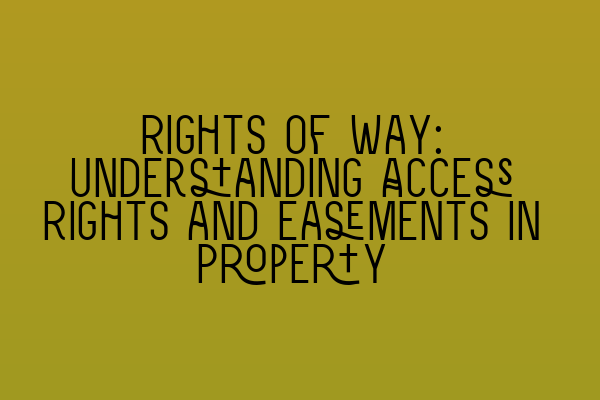Rights of Way: Understanding Access Rights and Easements in Property
As a property owner or buyer, it is crucial to have a good understanding of the rights of way and easements associated with the property. These legal concepts govern the access and use of land, and can have a significant impact on your property rights and potential liabilities.
In this comprehensive guide, we will explain what rights of way and easements are, the different types of access rights, and why they are important. So, let’s get started!
What are Rights of Way?
Rights of way are legal rights that allow individuals or entities to pass over or use someone else’s land for a specified purpose. These rights can be granted explicitly in a deed, or they may arise through long-standing usage or necessity.
There are two main types of rights of way:
- Expressed Rights of Way: These are rights that are explicitly granted in a legal document, such as a deed or contract. They will outline the scope of the right, the purpose for which it can be used, and any limitations or conditions.
- Implied Rights of Way: These rights are not explicitly granted but are implied due to the circumstances or necessity. For example, if a landlocked property has no other access route except through a neighboring property, an implied right of way may be established.
Types of Access Rights
Access rights can take different forms, depending on the nature of the right and the specific situation. Here are some of the common types of access rights:
- Right of Passage: This is the most basic form of access right, allowing individuals to pass over the land on foot.
- Right to Drive: This type of access right allows individuals to drive vehicles, such as cars or motorcycles, over the land.
- Right to Park: This right grants individuals the ability to park their vehicles on the land.
- Pipeline Easements: These easements allow utility companies to install and maintain pipelines or utility lines on the land.
- Drainage Easements: These easements allow for the drainage of water from one property to another.
Why Understanding Access Rights is Important
Having a clear understanding of access rights is essential for property owners and buyers for several reasons:
- Property Use and Development: Access rights can affect how you can use and develop your property. For example, if you have a right of way for vehicles, you can construct a driveway to accommodate the necessary traffic.
- Property Valuation: Access rights can impact the value of your property. Properties with convenient access rights, such as a right to drive or park, may be more desirable and command a higher price.
- Liabilities and Responsibilities: Access rights come with responsibilities. If you have granted a right of way to someone, you may be liable for maintaining the access route or ensuring its safe use.
- Negotiating and Drafting Contracts: When buying or selling a property, understanding access rights is crucial for negotiating and drafting contracts. It ensures that all parties are aware of their rights and obligations.
Misrepresentation in Contracts: Unveiling Deceptive Practices
Ethics in Contract Law: Navigating the Moral and Legal Dimensions
A Closer Look at SQE Contract Law Syllabus
SQE Contract Law: Analyzing Landmark Cases and Influential Judicial Decisions
Contract Law for Services: Key Considerations and Best Practices
Resolving Disputes
Despite the existence of clear legal frameworks around rights of way, disputes can still arise. Common issues that may lead to disputes include:
- Unreasonable use of the access route
- Lack of maintenance of the access route
- Interference with the use or enjoyment of the property
- Disagreements over the scope or extent of the right of way
- Attempted changes to the access route without consent
In cases where disputes cannot be resolved amicably, legal action may be necessary. It is essential to seek professional legal advice to understand your rights and options in such situations.
In Conclusion
Rights of way and easements play a significant role in property law and can have a substantial impact on property rights and obligations. By understanding access rights, property owners and buyers can make informed decisions, negotiate contracts, and avoid potential disputes.
Misrepresentation in Contracts: Unveiling Deceptive Practices
Ethics in Contract Law: Navigating the Moral and Legal Dimensions
A Closer Look at SQE Contract Law Syllabus
SQE Contract Law: Analyzing Landmark Cases and Influential Judicial Decisions
Contract Law for Services: Key Considerations and Best Practices
